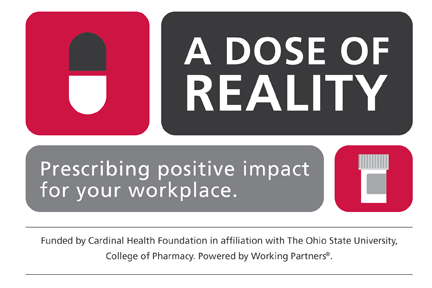Featured

The Legalization of Marijuana: It’s Time to Take a (Rational) Stand
Until recently, the noise around the issue of legalizing marijuana in Ohio was just a faint hum. Not so true anymore. Individuals and organizations on both sides of the issue have cranked up the volume over the past several months. Now it’s rare to go a day without being exposed to media coverage on the issue or getting involved in a debate with friends and family members.
President Obama publicly declared that marijuana is no more dangerous than alcohol and nothing more than a “bad habit.” Conversely, the American Medical Association, bucking against pressure to neutralize its position, released a statement opposing legalization because cannabis is a “dangerous drug” and a “public health concern.”
To be sure, there are strong opinions on both sides of the issue. Proponents of legalization argue marijuana is less harmful than opiates for treating pain, are tired of waiting on the Food and Drug Administration (FDA) to approve the drug as medicine, and claim “the greatest harm associated with marijuana is prison.” They also cite increased tax revenue for the state as an incentive for legalization.
Those opposing legalization cite studies linking the drug to addiction, respiratory illnesses, psychosis, traffic crashes and negative impacts on attention, learning and memory. Opponents also point to the negative consequences experienced by states that have already legalized the drug including higher rates of use among young people and increased incidences of people driving under the influence. Regarding tax revenue, the opposition points to taxes generated from alcohol and tobacco sales, which are dwarfed by the costs associated with substance abuse (e.g., decreased productivity and increased healthcare and crime).
The debate is creeping into the advertising world, as well. The Marijuana Policy Project, the self-proclaimed “leading effort in Washington D.C. to pass federal medical marijuana legislation,” produced a video promoting legalization and purchased ad space to air it at a recent NASCAR event. But just hours before the flag was dropped, the media company dropped the ad, citing that the company “does not in any way, shape or form, support the use of marijuana nor the promotion of illegal drugs at a family event.”
Where the two camps do meet is on emotional ground. Passion fuels both sides of the debate and is likely rooted in personal experiences with such things as use or abstinence, drug abuse and addiction by oneself or loved ones, and physical pain. Pictures and images of people in wheelchairs, children with bongs, and pain sufferers in hospital beds further fan the emotional flame.
These extreme emotions can make it very difficult to examine the issue rationally. At a recent Town Hall meeting in Columbus, Ohio, sponsored by WSYX ABC 6 News, only a few moments passed before shouting erupted from the audience. Because many in the audience were supportive of the proposed amendment, the panelists opposed to the issue were heckled each time they tried to make a point.
The issue of whether or not to legalize marijuana is emotional. And it is intense.
So where and how do business stakeholders enter the debate? Keeping with sound business practices, how do they form impressions and related responses based more on fact and rationality than emotion?
Working Partners®, operating as both a business and an advocate to businesses around alcohol/drug issues, continues to examine the issue of marijuana legalization. And our commitment to you, our clients and partners, is to arm you with information and opportunities so you can form your own opinions from a business perspective about this important issue.
We are not experts in pharmacology or medicine, but are instead proficient and dedicated to helping our clients operationalize policy and law. What we bring to the table regarding legalization are sound concerns about the safety, legal and financial ramifications such laws would have on workplaces — especially if such issues are determined by popular vote.
In short, in our opinion the legalization of marijuana has significant operational implications for employers and their businesses:
- We assert that the issue of whether or not to legalize marijuana for medical or broader use does not reside in a silo. A businessperson cannot look at legalization without considering other business issues such as employment law, including discrimination and hiring/firing practices; multi-state considerations; workers’ compensation and other insurance coverage; and compliance with federal authorities such as the Department of Transportation.
- We do not believe the decision for whether marijuana can safely and effectively be used as medicine should be determined in a voting booth. Instead, these delicate medical decisions should be handled in the nation’s standard manner for medication validation (i.e., by the FDA).
- We also remind employers that hammering out the employment operational issues of a constitutional amendment legalizing marijuana will occur in court – most often at the expense of the employer.
The issues surrounding marijuana are complex – particularly those involving legalization. And businesses are at the epicenter of the debate, as legalization poses some real challenges in terms of buffering against liability and maintaining a safe and productive workforce.
We encourage you to watch for other Working Partners® updates on the issue and walk with us through this debate. Rest assured we will keep your interests in mind when reviewing related research, legislation and media reports.
Opportunities to learn more:
- May 8th – FREE Webinar on the business implications of legalization, sponsored by Foley Carrier Services and delivered by Working Partners®
- Contact Working Partners® for information about NEW employee education curriculum about marijuana.
(DON’T FORGET: Click on the boxes to the right for our columns)
DISCLAIMER: This publication is designed to provide accurate information regarding the subject matter covered. It is provided with the understanding that those involved in the publication are not engaged in rendering legal counsel. If legal advice is required, the services of a competent professional should be sought.